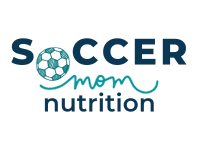Nutrition for Recovery Following Exercise
After finishing an intense training session, competitive game or a hard conditioning session in the weight room, you need nutrition for recovery.
But what should you eat or drink?
Popular magazines, websites, and fitness gurus might have you thinking that you need a “magic” refueling drink or specially made meal to replace electrolytes and nutrients.
But the truth is, by following a few steps, your recovery after exercise can be fueled by real food.
And depending on how long you exercised, a regular meal might be the nutrition you need for exercise recovery.
Whether you’re a recreational athlete, on a competitive team or training for your next activity following some basic guidelines will help you refuel your body so you’re ready for your next session.
Read on to learn more.
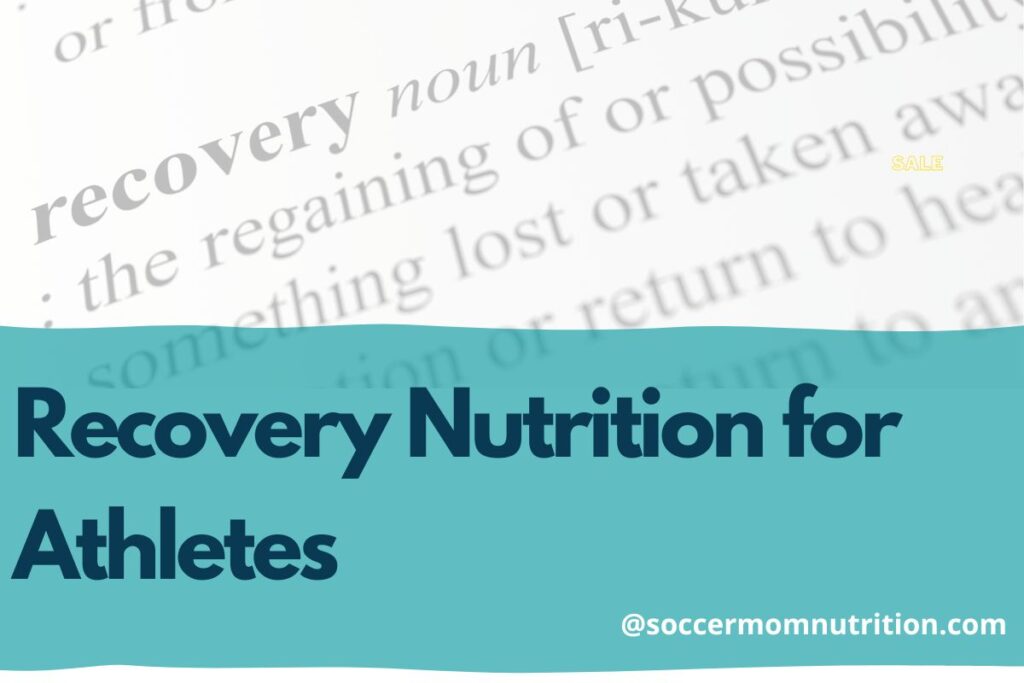
What is recovery
Recovery is a return to a steady state.
Overall, recovery nutrition for athletes means you’ve restored your energy capacity and feel ready to engage in the next practice or competition.
Your muscles and liver glycogen (the storage form of carbohydrate in your body) stores are full, you’re hydrated, your muscle mass maintained and rested.
In order to train and compete optimally, athletes must recover quickly between exercise events.
From weekend warriors to competitive athletes, recovery encourages continued participation and engagement in activities and reduces fatigue.
Why focus on nutrition for recovery
Eating for optimal performance includes eating to recover from your activity.
When you exercise, your body fuels itself with the energy (glycogen) stored in your muscles and those stores run out the longer and more intense your activities are.
By implementing a performance sports nutrition plan, you’ll ensure that you’re maxing out your muscle energy stores. Indeed, the better fueled those energy stores are, the better you can power through a practice or competition.
After you exercise you need to replace those muscle glycogen energy stores, rehydrate and repair and rebuild your muscles.
So that you’re ready to get back on the court or field the next day, or even late in the day, you should have a plan in place for nutrition for recovery.
Goals of nutrition for recovery
The goals of using nutrition for recovery supports an athletes’ recovery process. These goals include:
- Refueling
- Repairing, building, maintaining muscle protein
- Rehydrating and replenishing fluids and electrolytes
- Promoting adaptations from exercise
- Supporting immune function
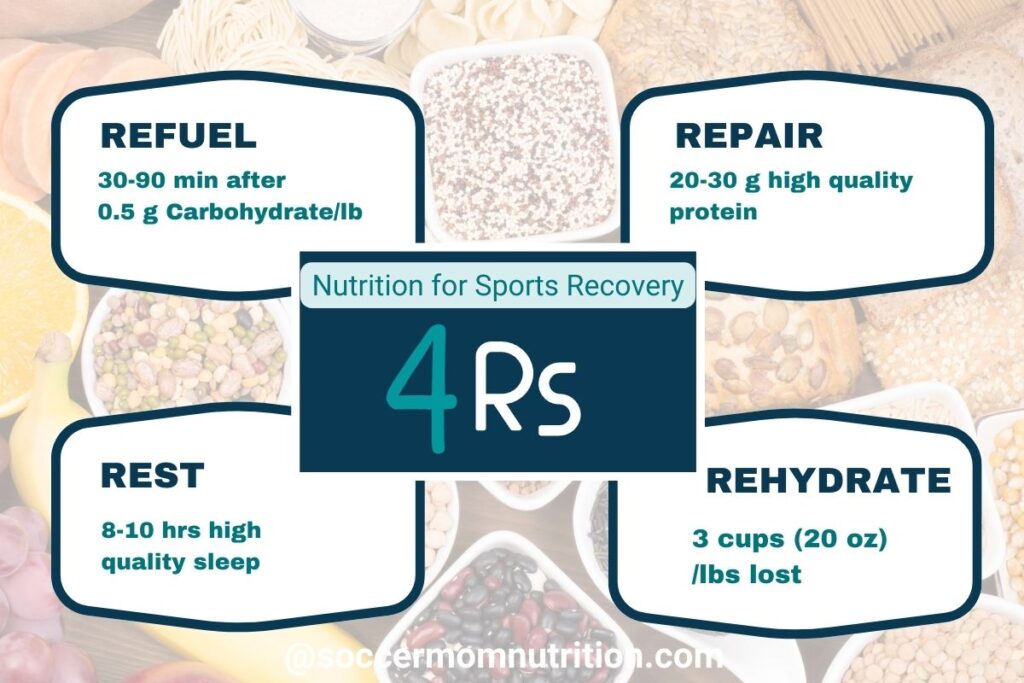
When recovery nutrition isn’t optimized
As exercise duration and intensity increases, glycogen stores will be reduced to the point of fatigue. Also, without a proper nutrition recovery plan you may not fully restore your energy stores before the next training or competition.
Without proper nutrition recovery you may experience:
- Risk of injury
- Lack of energy and endurance at next session
- Reduced focus and concentration
- General fatigue and tiredness
- Muscle soreness and cramping
Do all athletes need nutrition for recovery
Generally athletes who eat a nutrient dense balanced diet with high/moderate carbohydrates, moderate protein and lower fat can meet the energy needs required by their activity.
However, it becomes more difficult for athletes competing in more demanding activities (1).
As the frequency and duration increase, the greater amount of carbohydrate needed to replace glycogen stores. In these instances, it’s not likely the athlete can eat enough food on a daily basis to maintain energy stores. Hence the need for a performance nutrition plan.
Timing of recovery nutrition
Your body responds best to recovery when you eat within the first 30-90 minutes following activity. It takes about four hours for carbohydrates to be digested and stored as glycogen in the liver and muscles.
So, starting the refueling is important and should continue with smaller meals over the next 2-4 hours. However, it tends to take around 24 to 36 hours to fully recover the muscle carbohydrates used during your activity.
4 Rs-principles for nutrition for recovery
- Refuel
- Repair
- Rehydrate
- Rest
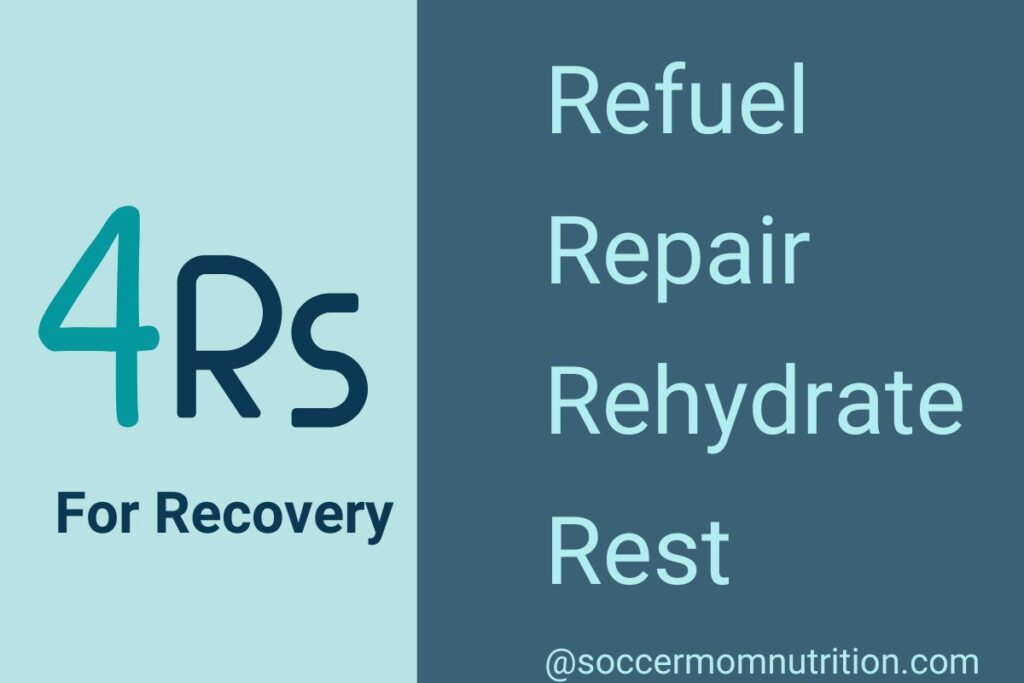
Refueling
Nutrient timing is just as essential to refueling as it is for pre game fueling. Try to eat or drink carbohydrate rich foods within the first 30 min to 2 hrs after exercise because that is when your muscles are most receptive to refueling.
An ideal refueling snack or meal includes carbohydrates and protein.
Additionally, eating a nutrient dense carbohydrate food that contains vitamins and minerals can help reduce inflammation and support your immune system. Adding a piece of fruit or juice to your snack or meal is a quick and easy option.

Athletes who don’t feel like eating anything after exercise should focus on rehydrating with a carbohydrate rich drink like fruit juice, chocolate milk or a smoothie.
You should also eat a regular high carbohydrate meal within 3-4 hours of your exercise session. The goals being:
- Replenish muscle glycogen stores
- Prevent further depletion of glycogen stores
- Consume 50-150 grams (0.5 g/lb) of carbohydrate post exercise
Refueling plans may vary based on sport, frequency of activities and how many hours are in between (like tournament days). Those specific tactics will be discussed in other blog posts.
Repairing
Consuming a high quality protein following activity has been shown to help muscle growth (protein synthesis) as well as prevent muscle breakdown. (2)
In fact, pairing the protein at a 3:1 carbohydrate to protein ratio, has had a positive effect on maintaining protein balance.
The optimal recommendation for how much protein to eat after exercise is around 25-30 grams depending on the athletes age and body weight. Again, as discussed in our post on performance nutrition, more protein does not equal more muscle.
Rather, you should spread out your protein consumption throughout the day with about 15-20 grams with snacks and 20-30 grams at meals.
Rehydrating
An athlete who sweats alot needs to drink alot. So one of the most important goals of nutrition for recovery is rehydrating. In many sports it’s not possible to compensate for fluid lost during the activity.
Therefore, it’s critical to begin rehydration as soon as possible.
Generally for quick rehydration, the recommendation is to consume about 3 cups of water (20 oz) per pound of body weight lost during activity. Since the goal is to get back to the pre-activity weight within 24 hours.
To encourage more fluid intake, you may try drinking a beverage that is flavored or contains some glucose, like a sports drink. Even better, drinking chocolate milk can promote rehydration, glycogen stores and muscle repair.
Lastly, by following a hydration plan even before you exercise, you can try to reduce the likelihood of dehydration and fluid loss.
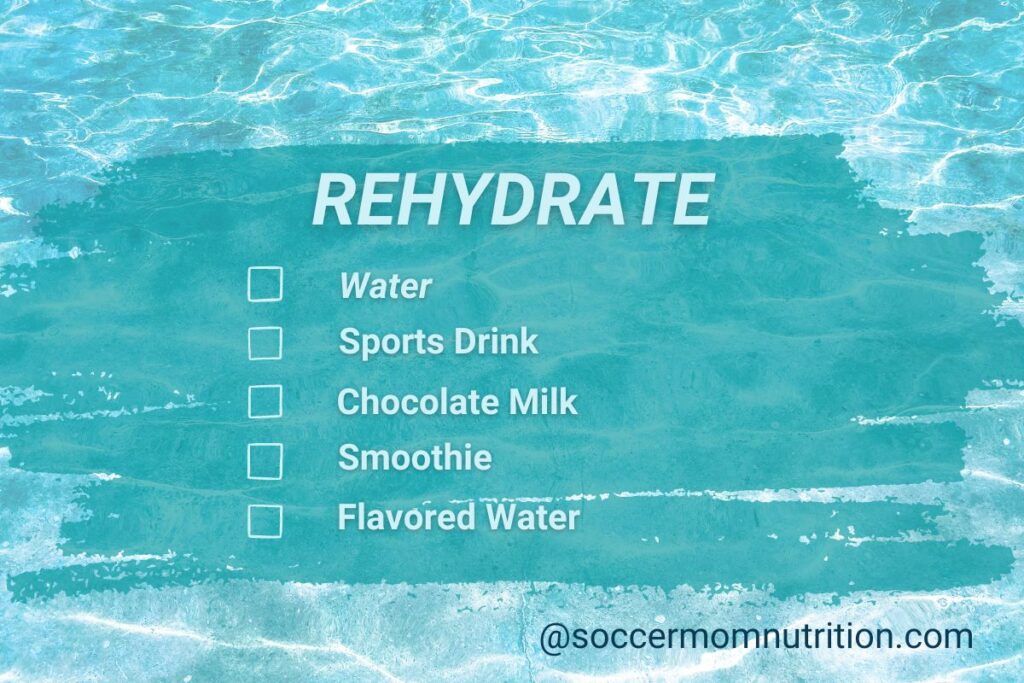
Rest
Required to recover, growth and for a strong immune system. Eating before sleep has been shown to have a restoring effect on muscles, brain and nerves and your immune system (3).
In fact good sleep habits, napping and quality sleep can improve performance.
Sample recovery snacks for 60-90 minutes after exercise
- Chocolate milk and graham crackers or granola bar
- Yogurt or low fat milk smoothie with fruit juice/berries
- Yogurt with granola and berries
- Fruit juice and granola bar/power bar
- Fig Newtons with milk
- Bagel with turkey or nut butter, satsuma
- High protein vegan snacks paired with a carbohydrate
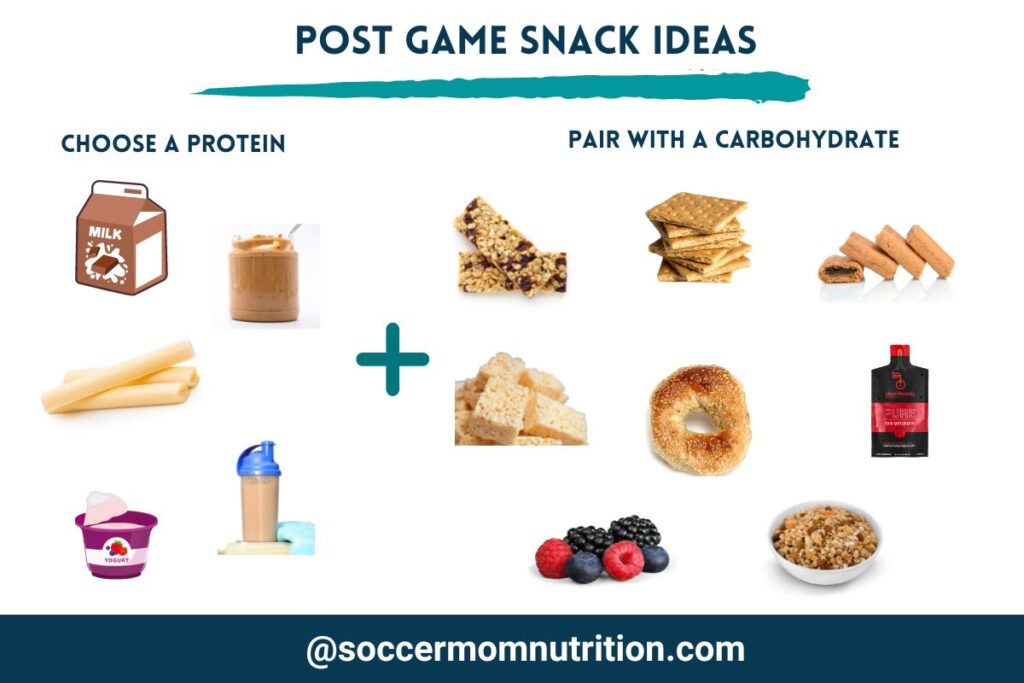
Final thoughts
Recovering from exercise is just as important as fueling and training for the practice, game or competition. In order to achieve optimal exercise performance, you need a good nutrition recovery plan. This way you’ll be ready and excited for the next event.
Let me know in the comments your best recovery tips.
Stephanie Magill, MS, RD, CD, FAND has over 22 years of experience in public health and nutrition. As a performance registered dietitian nutritionist, Stephanie specializes in sports nutrition and provides simple and actionable information so that athletes can be well fueled for high performance on and off the field. Stephanie has a Master’s Degree in Nutrition and is a Fellow of the Academy of Nutrition and Dietetics.
